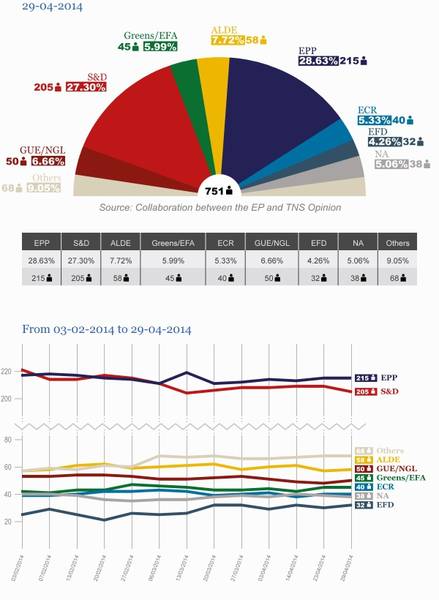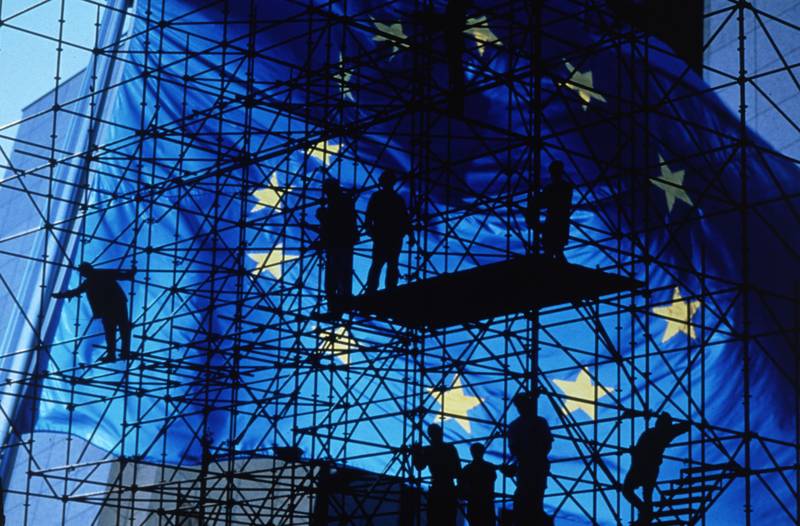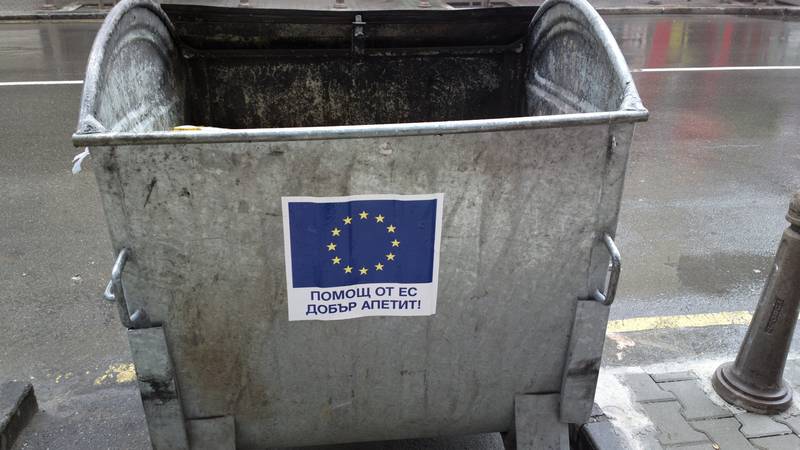A European Union of Zombies
Adelina Marini, May 8, 2014
 There is no doubt that what awaits the EU and the member states after the European elections in the end of May this year will be a huge test for the Union's system of values. In the best case scenario, what awaits the Union will neither be more nor less Europe but rather more sobering and pragmatism. In the worst case scenario, however, we are to witness a European apocalypse. The reason for this are the growingly convincing polls that suggest that the so called eurosceptic parties will have sufficient majority in the new European Parliament to be able to put an end to the current ideology of creating more Europe. May be, it is not an accident that the EPP candidate for the European Commission presidency, Jean-Claude Juncker, said during the first debate last week that he was striving for a serious Europe not a dreaming Europe.
There is no doubt that what awaits the EU and the member states after the European elections in the end of May this year will be a huge test for the Union's system of values. In the best case scenario, what awaits the Union will neither be more nor less Europe but rather more sobering and pragmatism. In the worst case scenario, however, we are to witness a European apocalypse. The reason for this are the growingly convincing polls that suggest that the so called eurosceptic parties will have sufficient majority in the new European Parliament to be able to put an end to the current ideology of creating more Europe. May be, it is not an accident that the EPP candidate for the European Commission presidency, Jean-Claude Juncker, said during the first debate last week that he was striving for a serious Europe not a dreaming Europe.
Most European think-tanks are of the opinion that the eurosceptics will have a very strong voice in the next term. According to the European Council on Foreign Relations (ECFR), a possible coalition of eurosceptic parties will make the life of many mainstream parties in the European Parliament very difficult. They will be able to block the appointment of the European Commission, to veto key legislation, to block the signing of international treaties and trade agreements and to even hinder the European budget. All this against the backdrop of the dark clouds coming from the east and the good, but not inspiring spring forecast of the European Commission about the economic perspectives.
How scary the eurosceptics are?
In their large-scale brief, Mark Leonard and Jose Ignacio Torreblanca divide the problematic parties into four main groups. In the first, they put the far-right parties which, however, are not a homogeneous group because the western European far-right, which includes Marine le Pen's National Front, Lega Nord in Italy, the Dutch Freedom Party and the Austrian Freedom Party, are trying to detoxify themselves. However, in their group are also the central-, eastern- and southeastern European far-right parties like Golden Dawn in Greece, Jobbik in Hungary, Dawn of Direct Democracy in the Czech Republic and the Bulgarian party Ataka which are openly xenophobic and anti-Semitic platforms. In some cases, their scepticism, according to the authors, is aimed at the representative democracy at large. The two subgroups share common visions on migration and are against the euro agenda, but they differentiate on many other things which makes their cohesion difficult.
The second major group which emerges in Leonard's and Torreblanca's analysis, includes, again, right-wing formations like the United Kingdom Independent Party (UKIP), Alternative for Germany, the Flemish Interest (Vlaams Belang), the Slovak National Party, the Danish People’s Party, the Swedish Democrats, and the Finns Party in Finland. In essence, they are not against the representative democracy, nor the fundamental political and civil liberties, although they are trying to exclude certain ethnic or religious communities like the Muslims viewed by them as incapable to integrate. These parties, generally, refrain from violence. The same cannot be said about the first group, especially about some parties in it, although this is not explicitly mentioned in the ECFR analysis.
The second group does not view democracy as a threat or a problem but they view the EU as a threat to national democracy and sovereignty. They strive for a return to national currency (if they are in the euro area), border control (if members of Schengen), to suspend the freedom of establishment and movement and even for leaving the EU if their demands are not met. Neither of the groups has a name in the ECFR analysis which is why euinside affords itself to name them for convenience. So, we can safely name the first group Xenophobic and the second one Democratically Nationalistic.
Leonard's and Torreblanca's third group consists of conservative parties which are members of the European Conservatives and Reformists group in the European Parliament. Currently, its members are the British Conservative Party led by Prime Minister David Cameron, the Polish Law and Justice Party, the Civic Democratic Party in the Czech Republic, the Dutch ChristenUnie, and the Latvian National Alliance. With some reservation, the authors stitch to this group the Czech Party Ano (Yes). However, they have omitted to include in it the Croatian Party for Rights Dr Ante Starcevic, led by Ruza Tomasic. A probable reason for this omission is that she entered the European Parliament through the list of the Croatian Democratic Union (HDZ) which, for its part, is a member of the European People's Party. These groups rarely vote for "more Europe" and are internally divided on issues like the common currency and migration. Because they do not participate in government, it is quite possible that they are open for compromises toward the mainstream pro-European forces rather than toward the Xenophobic or the Democratically Nationalistic group, the analysts believe. We can call this group a Tea Party of reasonable people/parties.
The fourth group are the left eurosceptics like the Coalition of Radical Left (Syriza) In Greece, Die Linke in Germany and the Socialist Party in the Netherlands, which are part of the European United Left/Nordic Green Left group in the European Parliament. ECFR views them as eurosceptic in the traditional sense of the word, which means parties that do not share the right-wing eurosceptics' anti-migration agenda, but are deeply critical to the EU in its current view. They want to abolish the euro and that is why they often vote 'nay' on issues like the euro area governance, trade or the single market. Mark Leonard and Jose Ignacio Torreblanca admit that it is possible, from time to time, this group to be joined by the Greens because one of their leaders, the semi-candidate for European Commission chief Jose Bove (semi because there is another Green candidate - Ska Keller) is an anti-globalisation activist. The authors believe that Beppe Grillo's Five Star movement could feel comfortably in this group.
Of all these groups the scariest, undoubtedly, is the Xenophobic one. ECFR believes that it is hard to forecast with accuracy how many will the eurosceptic MEPs be in the next European Parliament, but they suggest that 175 parties have a chance to win a seat. Decisive for the outcome of these elections will be voter turnout which is in constant decline. In 2009, in France it was 40% and in UK it was 34%. The overall turnout in the EU was 43% and in Bulgaria it was 39 per cent. If the eurosceptics refuse to vote, this could be a great advantage for the pro-European parties. On the other hand, however, the analysts believe, they might succeed to mobilise their troops by hoping to punish national governments because of their bad economic performance. According to another think-tank, Open Europe, the eurosceptics may take 31% of the votes (up from 25% in 2009) which translates into 218 seats out of 751. The analysts from this think-tank believe that fears of invasion by anti-European parties (they do not call them eurosceptic) are overrated.
National democracy is already emptied of content
The main culprit for the current situation are the mainstream parties which seem not to be realising their responsibility nor the scale of the disaster. What they could do to prevent a landslide victory of the eurosceptics is to admit their mistakes and to offer an alternative. Something they are not doing, said in an interview with this website one of the authors of the ECFR brief - Jose Ignacio Torreblanca. Currently, the mainstream parties bet on certain in the race with each other by focusing the debate along the axis left-right, as euinside recently wrote. Mr Torreblanca explains this pointing out that they cannot talk about more or less Europe because they already have a "coalition government" in the European Commission which consists of s sufficient number of Socialist commissioners, representatives of the EPP and the Liberals. The three largest groups in the European Parliament - Socialists and Democrats, EPP and ALDE - often vote together for more Europe. The only thing that distinguishes them clearly is the left-right ideology.
The problem is, though, the analyst believes, that the European project is clearly in danger. It should not be taken for granted because it is not a natural subject. If it is not taken care of, protected and encouraged it will not survive. Strong leadership is needed and more ideas to save it. The most important thing, however, is to be frank with citizens and to tell them that national democracies have been emptied and stripped of the most important traditional powers. That is why democracy and politics should be rethought at European level because national governments now look like zombies. They are like walking dead in the sense that they can no longer govern but they do not tell this to the people. The eurosceptics, on the contrary, are much clearer and blunt. They simply say that Europe is the problem and the national state is the solution. And although this is not true, according to Jose Ignacio Torreblanca, the message is very strong.
The solution is to build a true European democracy at European level because that no man's land we find ourselves in is most devastating for the pro-European forces and creates a feeding ground for the eurosceptics, the Spanish analyst concluded.
What impact will this have on the reforms debate in EU?
 Jose Ignacio Torreblanca says the key lies with France because it is there that the eurosceptic forces (let's not forget that the ECFR puts them in the Xenophobic group) will be or already are the second largest political force in the country. So, the likelihood to seek deepening of the euro area integration to an extent that requires treaty change is very small because this would mean a referendum in France. It is unthinkable that the French government will face the voters at a referendum because it is certain that this will be an anti-government vote. It is most realistic to expect that a more subtle back-door integration will be sought, the head of the ECFR Madrid office said.
Jose Ignacio Torreblanca says the key lies with France because it is there that the eurosceptic forces (let's not forget that the ECFR puts them in the Xenophobic group) will be or already are the second largest political force in the country. So, the likelihood to seek deepening of the euro area integration to an extent that requires treaty change is very small because this would mean a referendum in France. It is unthinkable that the French government will face the voters at a referendum because it is certain that this will be an anti-government vote. It is most realistic to expect that a more subtle back-door integration will be sought, the head of the ECFR Madrid office said.
Open Europe, who are entirely dedicated on propagating a reform of the EU, believe that these elections will in fact produce a much more integrationist European Parliament. Two thirds or more of the European voters might not vote at all or vote explicitly against the status quo and deepening of the integration because of the lack of intermediate options. This is precisely why, the think-tank writes in its analysis on the issue, that the European elite should respond with broad reforms. If there is more focus on centralisation this will fuel even more anti-European votes.
The outcome for Bulgaria
The irony is that one of the status quo parties is strongly pro-European. This means that if GERB (EPP) succeeds to send at least as many MEPs as the heir of the communist party BSP (PES), as the opinion polls suggest, there are chances Bulgaria to stop its alienation from the European orbit. This, however, does not at all mean that reforms are coming to Bulgaria nor that its voice will become stronger on issues from the European agenda. Against the backdrop of the civilisational clash that is growing in the country, however, this is after all not a bad news.
The big question is what share of the electorate will like the reformers who have the most European platform and are the first political force in years to speak concretely on certain European issues. For now, the pollsters give them no more than 1-2 seats if any which is strongly dependent on voter turnout. There is another strongly pro-European party in the country - Blue Unity - but it is too small and has miserable chances to jump over the threshold after it left the reformers. Another big issue is whether Bulgaria will finally send, for the first time, a Green MEP. The chances for this are minor.
 | © European Commission
| © European Commission | © euinside
| © euinside Angela Merkel | © Council of EU
Angela Merkel | © Council of EU